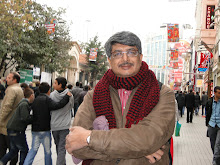Dasara or Dushera is a major Indian festival and is the culmination of and follows a period of nine days preceding it. This day is also known as Vijayadashmi, the tenth day - a day of victory. It is celebrated in most parts of India.
In a large country as ours and with diverse cultures co-existing, it is but natural that there will be varying interpretations. This is often seen in different themes that seem prominent in each region.
To me, a product of post independence India, and, moulded in the liberal school of thought, this was a dilemma of sorts. What is this festival? What is its significance?
I found that most of us had no clue about the deeper meaning. It was identified as an event that happened in hoary times...destruction of the demon Mahisasura by Goddess Kali or the defeat of Ravana at the hands of Lord Rama. At some places it was identified as worshipping the feminine aspect of the divine and thus Goddess Durga was worshipped for the first three days, Goddess Laxmi for the next three and Goddess Saraswati for the last three days. The "Devi Kavach" honours the nine forms of the Goddess.
Come west to the state of Gujarat, and Garba takes centre stage. I do not refer to the modern day dancing to film and pop music. Traditionally, Garba form of dance was a worship of the Devi-Shakti, and the earthern pot with with a "diya" lit inside represented the womb and fertlity.
I felt these linkages seem symbolic and a message is being conveyed or these indicate that it is time to introspect, review and change.
In my next post, I hope to share with you all how I understood the significance of Navratri and what it really meant.


No comments:
Post a Comment